Unit 2 My Favourite School Subject-Lesson 12课件(共20张PPT)
文档属性
| 名称 | Unit 2 My Favourite School Subject-Lesson 12课件(共20张PPT) |
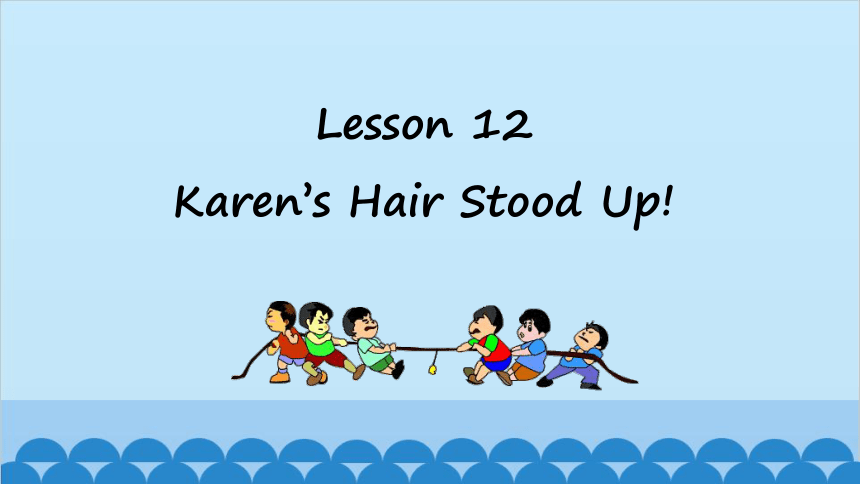
|
|
| 格式 | ppt | ||
| 文件大小 | 506.5KB | ||
| 资源类型 | 教案 | ||
| 版本资源 | 冀教版 | ||
| 科目 | 英语 | ||
| 更新时间 | 2023-07-14 10:10:13 | ||
图片预览

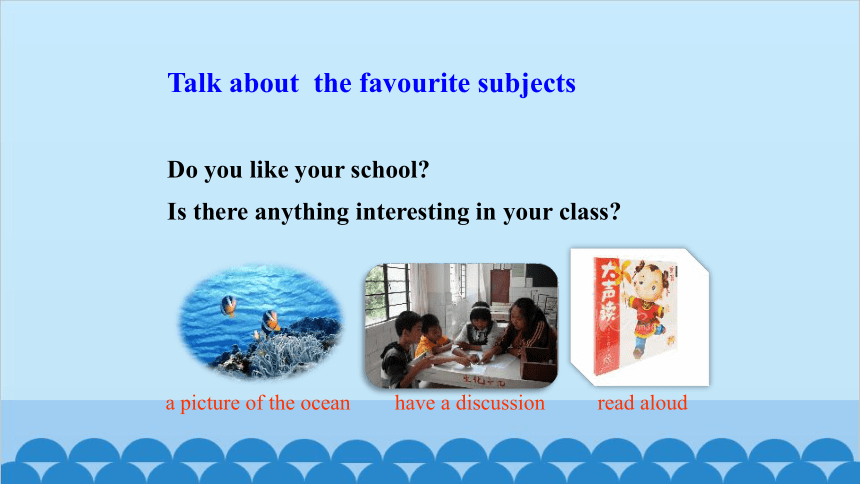
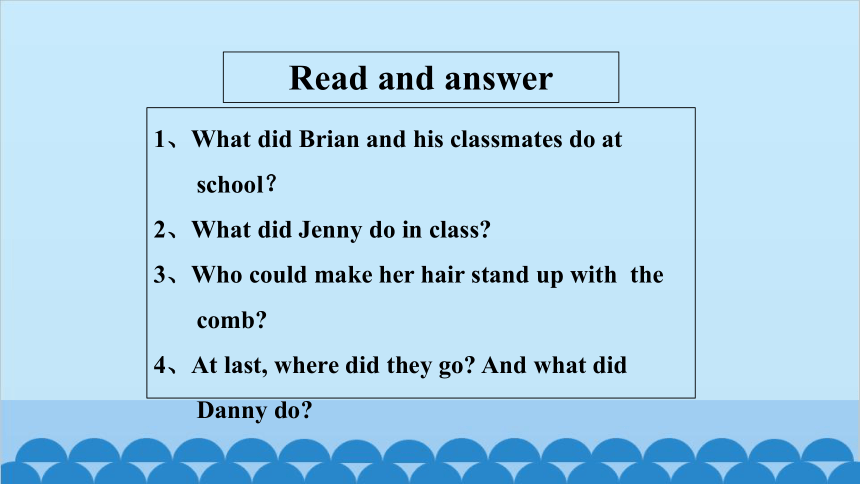
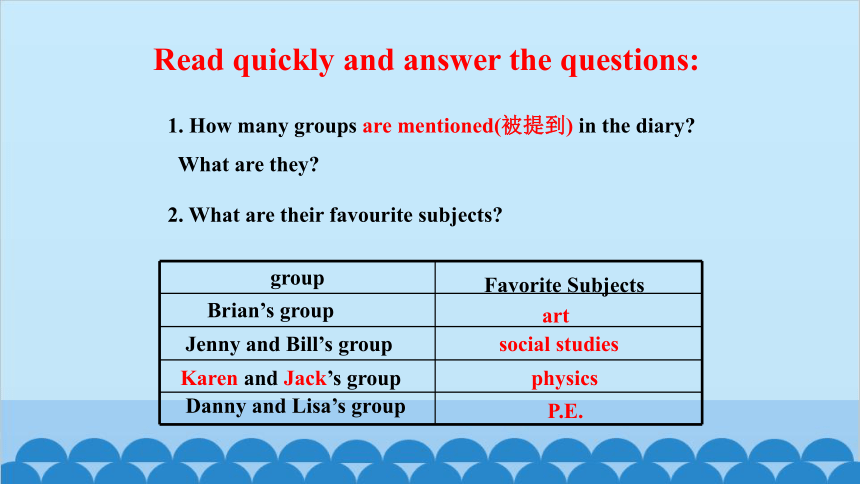
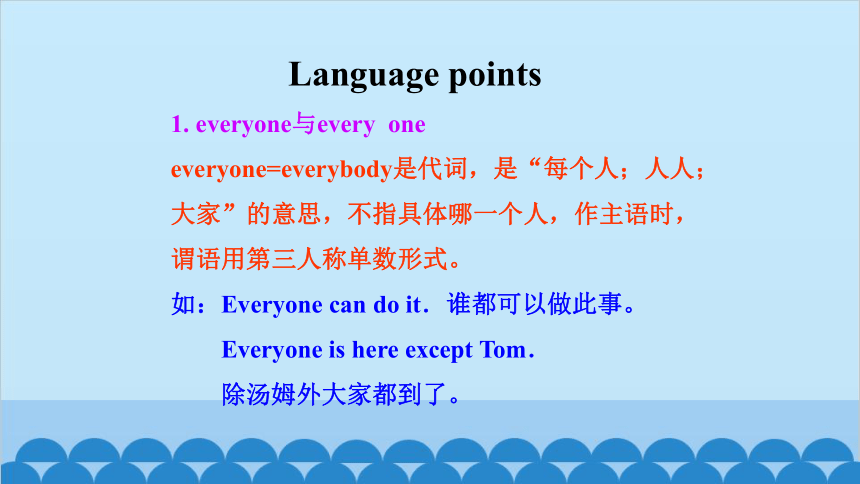
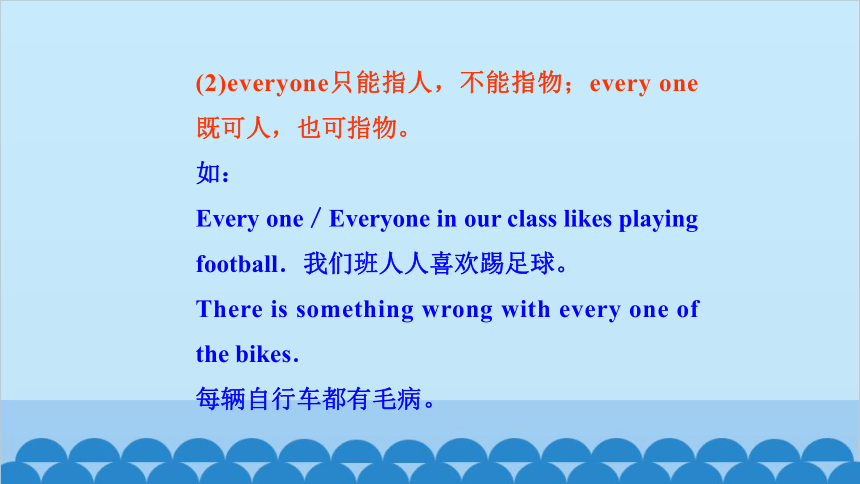
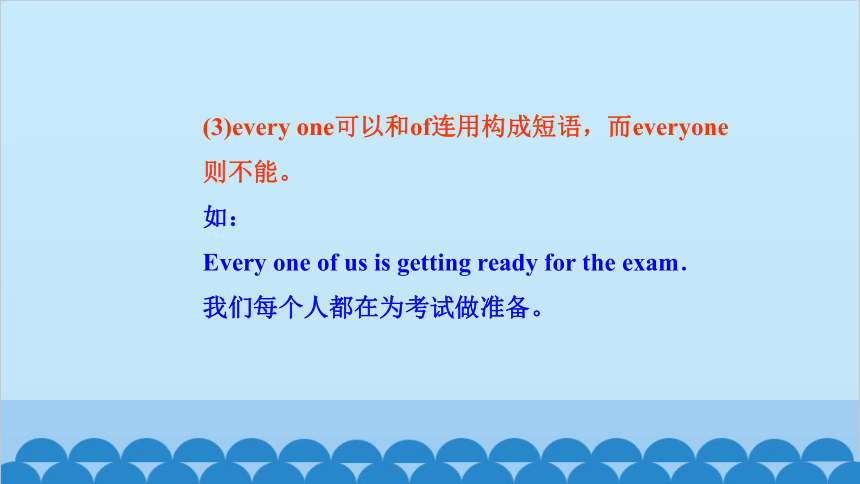
文档简介
(共20张PPT)
Lesson 12
Karen’s Hair Stood Up!
Talk about the favourite subjects
Do you like your school
Is there anything interesting in your class
a picture of the ocean
have a discussion
read aloud
Read and answer
1、What did Brian and his classmates do at school?
2、What did Jenny do in class
3、Who could make her hair stand up with the comb
4、At last, where did they go And what did Danny do
Read quickly and answer the questions:
group
art
social studies
P.E.
Brian’s group
Jenny and Bill’s group
Danny and Lisa’s group
Favorite Subjects
1. How many groups are mentioned(被提到) in the diary
What are they
2. What are their favourite subjects
physics
Karen and Jack’s group
Language points
1. everyone与every one
everyone=everybody是代词,是“每个人;人人;大家”的意思,不指具体哪一个人,作主语时,谓语用第三人称单数形式。
如:Everyone can do it.谁都可以做此事。
Everyone is here except Tom.
除汤姆外大家都到了。
(2)everyone只能指人,不能指物;every one既可人,也可指物。
如:
Every one/Everyone in our class likes playing football.我们班人人喜欢踢足球。
There is something wrong with every one of the bikes.
每辆自行车都有毛病。
(3)every one可以和of连用构成短语,而everyone
则不能。
如:
Every one of us is getting ready for the exam.
我们每个人都在为考试做准备。
2. We each brought a painting to class.
each作主语的同位语,放在主语的后面,此时的主语和谓语都用复数形式。
如:
They each want to sign the paper.
他们每个人都想在纸上签名。
each作主语,谓语用第三人称单数形式。
如:
There are many people there,each has a newspaper.
那里有许多人,每人有一张报纸。
Each of us goes to school on foot.
我们每个人都步行上学。
each作定语时,后接单数可数名词,谓语动词也用单数。这时的each是形容词。
如:Each student has a dictionary.
每个学生都有一本字典。
each作状语。
如:You will choose a card each.
你们每人可以挑一张卡片。
3.The picture always reminds me of that holiday.
(1)remind sb. of sth. 意为“使某人想起某事”。
如:This book reminds me of my father.
这本书使我想起了我的父亲。
(2) make sb.remember sth. = remind sb. of sth.使某人想起某事。
4. Everyone was very surprised.
(1). surprised 意为“对……感到惊讶”,主语一般是人
如: We are surprised at the good news.
听到这好消息,我们都很惊讶。
(2). surprising 意为“令人惊奇的”,多形容事物的特点。
如: It is a surprising game.
这是场出乎意料的比赛。
4. Finally, Danny and Lisa presented their favourite subject.
finally, at last 和 in the end三者皆可为“最后”。
finally,表示动作发生的顺序在最后,一般放在句首at last 经过一定的困难之后,强调努力的结果。
如:
I hope that everyone is good in the end.
Did the man in the shop understand him at last.
Finally he went to see the famous man himself.
Have a try
Work in Groups. Discuss your favourite
subject. Then present it to the class.
根据课文内容,用适当的介词填空
1.We talked _______ the class _______ our favourite subject.
2. My group talked ________ art.
3. My family took a trip ________ the ocean.
4. The picture reminds me_________that holiday.
5. She also read some letters and e-mails _________ her .
friend _______ China, Li Ming.
6. She could also make her hair stand up _____ the comb.
to
about
in
with
about
to
of
from
Homework
What did they do
First Brian’s group
Next Jenny and Bill
Then Karen and Jack
Finally Danny and Lisa
Retell the diary:
Thank you!
Lesson 12
Karen’s Hair Stood Up!
Talk about the favourite subjects
Do you like your school
Is there anything interesting in your class
a picture of the ocean
have a discussion
read aloud
Read and answer
1、What did Brian and his classmates do at school?
2、What did Jenny do in class
3、Who could make her hair stand up with the comb
4、At last, where did they go And what did Danny do
Read quickly and answer the questions:
group
art
social studies
P.E.
Brian’s group
Jenny and Bill’s group
Danny and Lisa’s group
Favorite Subjects
1. How many groups are mentioned(被提到) in the diary
What are they
2. What are their favourite subjects
physics
Karen and Jack’s group
Language points
1. everyone与every one
everyone=everybody是代词,是“每个人;人人;大家”的意思,不指具体哪一个人,作主语时,谓语用第三人称单数形式。
如:Everyone can do it.谁都可以做此事。
Everyone is here except Tom.
除汤姆外大家都到了。
(2)everyone只能指人,不能指物;every one既可人,也可指物。
如:
Every one/Everyone in our class likes playing football.我们班人人喜欢踢足球。
There is something wrong with every one of the bikes.
每辆自行车都有毛病。
(3)every one可以和of连用构成短语,而everyone
则不能。
如:
Every one of us is getting ready for the exam.
我们每个人都在为考试做准备。
2. We each brought a painting to class.
each作主语的同位语,放在主语的后面,此时的主语和谓语都用复数形式。
如:
They each want to sign the paper.
他们每个人都想在纸上签名。
each作主语,谓语用第三人称单数形式。
如:
There are many people there,each has a newspaper.
那里有许多人,每人有一张报纸。
Each of us goes to school on foot.
我们每个人都步行上学。
each作定语时,后接单数可数名词,谓语动词也用单数。这时的each是形容词。
如:Each student has a dictionary.
每个学生都有一本字典。
each作状语。
如:You will choose a card each.
你们每人可以挑一张卡片。
3.The picture always reminds me of that holiday.
(1)remind sb. of sth. 意为“使某人想起某事”。
如:This book reminds me of my father.
这本书使我想起了我的父亲。
(2) make sb.remember sth. = remind sb. of sth.使某人想起某事。
4. Everyone was very surprised.
(1). surprised 意为“对……感到惊讶”,主语一般是人
如: We are surprised at the good news.
听到这好消息,我们都很惊讶。
(2). surprising 意为“令人惊奇的”,多形容事物的特点。
如: It is a surprising game.
这是场出乎意料的比赛。
4. Finally, Danny and Lisa presented their favourite subject.
finally, at last 和 in the end三者皆可为“最后”。
finally,表示动作发生的顺序在最后,一般放在句首at last 经过一定的困难之后,强调努力的结果。
如:
I hope that everyone is good in the end.
Did the man in the shop understand him at last.
Finally he went to see the famous man himself.
Have a try
Work in Groups. Discuss your favourite
subject. Then present it to the class.
根据课文内容,用适当的介词填空
1.We talked _______ the class _______ our favourite subject.
2. My group talked ________ art.
3. My family took a trip ________ the ocean.
4. The picture reminds me_________that holiday.
5. She also read some letters and e-mails _________ her .
friend _______ China, Li Ming.
6. She could also make her hair stand up _____ the comb.
to
about
in
with
about
to
of
from
Homework
What did they do
First Brian’s group
Next Jenny and Bill
Then Karen and Jack
Finally Danny and Lisa
Retell the diary:
Thank you!
同课章节目录
- Unit 1 Me and My Class
- Lesson 1 Back to School!
- Lesson 2 Many Faces, One Picture
- Lesson 3 Getting to Know You!
- Lesson 4 Best Friends
- Lesson 5 Meet Ms. Liu
- Lesson 6 Jenny's Week
- Unit 2 My Favourite School Subject
- Lesson 7 Don't Be Late for Class!
- Lesson 8 E-mail Helpers!
- Lesson 9 I Don't Want to Miss Geography !
- Lesson 10 Looking for Lisa
- Lesson 11 Lily Learns about China !
- Lesson 12 Karen's Hair Stood Up!
- Unit Review
- Unit 3 Families Celebrate Togethe
- Lesson 13 I Love Autumn
- Lesson 14 Happy Memories
- Lesson 15 A Present for Li Ming!
- Lesson 16 Happy Thanksgiving!
- Lesson 17 Presents from Canada!
- Lesson 18 Li Ming's Birthday
- Unit Review
- Unit 4 My Neighbourhood
- Lesson 19 The Best Neighourhood
- Lesson 20 No Stopping!
- Lesson 21 Eat a Donut and Turn Right
- Lesson 22 I Like My Neighbourhood
- Lesson 23 People in My Neighbourhood
- Lesson 24 I Need a Map!
- Unit Review
- Unit 5 My Future
- Lesson 25 I Want to Be a Teacher!
- Lesson 26 What Will I Be ?
- Lesson 27 What's Your Advice?
- Lesson 28 Rich or Poor? It Doesn't Matter!
- Lesson 29 Our Ambitions and Dreams
- Lesson 30 A Famous Friend?
- Unit Review
- Unit 6 Go With Transportation !
- Lesson 31 How Do You Travel ?
- Lesson 32 Trains Go Faster !
- Lesson 33 Life on Wheels
- Lesson 34 Flying Donuts
- Lesson 35 Future Transportation
- Lesson 36 Clean Cars ?
- Unit Review
- Unit 7 Enjoy Your Hobby
- Lesson 37 What's Your Hobby ?
- Lesson 38 Hobbies Are Fun!
- Lesson 39 Danny's Hobby
- Lesson 40 What's Paul's Hobby?
- Lesson 41 Show and Tell!
- Lesson 42 The New Club
- Unit Review
- Unit 8 Celebrating Me
- Lesson 43 What Makes You Unique?
- Lesson 44 Georgia Plays Basketball
- Lesson 45 Be Yourself !
- Lesson 46 My Dream
- Lesson 47 I Made It !
- Lesson 48 Li Ming's Report
- Unit Review
